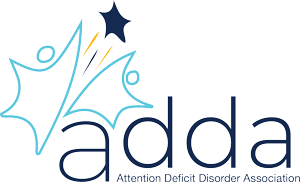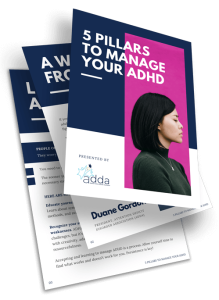
ADHD Time Blindness: How to Detect It & Regain Control Over Time
Imagine you’re boiling a pot of water for pasta. You decide to fold your laundry while waiting. But when you finally check back on your pot of water, it’s barely warm.
You then scroll through your phone on the couch for a few minutes while waiting. Suddenly, your partner asks you why there’s an empty pot cooking on the stove, and you rush back, only to find all the water has boiled off.
Your brain cannot make sense of this situation. You were sure that the time you spent folding laundry felt far longer than the time you spent on your phone.
This warped perception of time can be a common experience for people with attention-deficit/hyperactivity disorder (ADHD). In fact, time blindness is a common symptom of ADHD.
ADDA is full of people just like you. They struggle with deadlines and occasionally burn the casserole, but they found the right strategies and support to stay on track.
So, if you’re tired of the metaphorical smoke alarm going off, keep reading to find out how to manage your ADHD time blindness.
Originally published on Jan 11th, 2019, this article was republished on March 20th, 2025.
What Is Time Blindness?
Time blindness in adult ADHD is the inability to sense how much time has passed and estimate the time needed to get something done. It isn’t an official diagnosis, but it can significantly impact your daily life. Time blindness changes how you prioritize tasks, allocate time, and manage your schedule.
An example of time blindness for an ADHDer is underestimating the time needed to get ready for an appointment, causing you to turn up late. For a non-ADHDer, it’s easier to estimate the amount of time needed to prep and be on time.
Time blindness is a legitimate issue for people with ADHD. It’s not the intentional act of disregarding time or disrespecting someone else’s time.
The ADHD brain is simply wired in a way that changes a person’s ability to estimate and judge time.
If you’d like to learn more about ADHD time blindness, join the ADDA+ community . Get a deeper understanding of your ADHD and navigate your journey with confidence and resilience.
The ADHD Brain and Its Ureliable Relationship With Time
So why do we want to talk about brain science? Because when you understand this part, you can stop trying to fight against the way your brain works. Instead, you can lean into the tools and strategies that can help you meet the deadlines and appointments you really care about.
ADHD is a real medical condition that affects the structure and chemistry of the brain. Because of this, it isn’t surprising that ADHD affects time perception.
According to research, the ability to perceive and estimate time is linked to the activity levels of several areas of the brain, including the prefrontal cortex. A lower level of activity in these brain regions may contribute to poorer time perception.[1]
Additionally, a disruption in the connectivity between different areas of the default mode network may also contribute to time blindness in ADHD. The default mode network comprises several regions in the brain that turn on when your mind is wandering.[1]
Researchers have also found that time distortion is linked to medical conditions involving a disruption in dopamine signaling, a chemical messenger in the brain.[2]

In general, ADHD can bring about different types of challenges related to time involving the following aspects:[1], [3]
- Time perception or estimation: This is the ability to estimate how much time has passed. It also involves assessing the amount of time needed to complete a specific task.
- Time horizon: Our time horizon helps us determine how quickly a task is approaching and when we should start acting on it. People with ADHD tend to have a shorter time horizon and “future time blindness,” meaning that deadlines often enter their mental radar when it’s too late.
- Time management: Time management is the process of planning and coordinating how much time you spend on your tasks and activities. Because it is a multi-dimensional skill that involves concentration, memory, and planning, people with ADHD often face time management challenges.
- Time sequencing: This involves sequencing events or tasks in the right order of when they occurred.
- Time reproduction: This refers to the ability to repeat a specific action or task for the same amount of time as it was previously carried out.
Having time blindness does not mean you’re lazy, unmotivated, or self-centered.
Most people genuinely want to be on time and meet all their deadlines, but ADHD makes these goals more challenging.
Signs and Symptoms of Time Blindness
Learning how to identify time blindness is simple. Keep a watch out for the following signs and symptoms:[1],[3]
- Getting stuck in “waiting mode” (i.e., being unproductive for a long time while waiting for an event that seems near when it is, in fact, hours away)
- Feeling like you’re losing your grip on time, leading to impulsive decisions
- Underestimating or overestimating the amount of time needed for a task
- Struggling to estimate the amount of time previously spent on an activity
- Losing track of time, especially when hyperfocused on an activity
- Difficulty estimating how long ago an event or activity occurred
- Focusing only on the present and short-term gains
- Having trouble creating or adhering to a schedule
- Difficulty organizing tasks in the right sequence
- Procrastinating on tasks until the last minute
By understanding how time blindness hijacks your plans and productivity, it becomes easier to devise personalized strategies that will help you overcome it.

Time Blindness Effects in Relationships and Daily Routine
Time blindness may affect different areas of your life, including your relationships and work.
Due to time blindness, you might be chronically late to meetings and appointments. This could lead to conflicts or misunderstandings between you and your partner, friends, or family members.
You might also struggle to complete errands and household tasks on time, like picking up the kids from school or paying bills.
At your workplace, a poor perception of time can contribute to missed deadlines and rushed last-minute work. You may show up late for work and meetings and overpromise your time and productivity.
Like others, you’re probably tired of letting yourself and others down. You don’t have to be stuck there.
When this self-disappointment kicks in, remind yourself that success isn’t an all-or-nothing concept. Turn your mistakes into an opportunity to learn, and look for ways to prevent that same mishap from happening again. For a start, come and check out our community at ADDA+.
What Causes Time Blindness?
A range of factors can contribute to time blindness in ADHD. These include:
- A change in the chemical balance in the brain: Changes in dopamine levels in your ADHD brain can make it harder to estimate time and figure out how long tasks will take.[1]
- Poor executive function: ADHD is linked to executive dysfunction. Executive function refers to the skills needed to stay organized, plan ahead, and focus on essential details. When these skills are weaker due to ADHD, it can be challenging to gauge time, stick to a schedule, and meet deadlines.
- Hyperfocus: ADHD hyperfocus happens when you become absorbed in something you enjoy to the point that you lose your sense of time. You might spend way more time on one activity than you meant to, leaving much less room for other tasks.
- Working memory deficit: Your working memory helps you keep track of information you need at any present moment. Some research suggests that our working memory capacity can affect how well we judge and perceive time.[4] Thus, poorer working memory can make it harder to keep track of time.
- Emotional dysregulation: ADHD may make it difficult to control your emotions.[5] When you’re affected by strong emotions, like frustration, anger, stress, or excitement, this could take your focus off the clock, so time can slip by without you realizing it.
All of these characteristics are closely tied to how the ADHD brain works. So, if you’re struggling with it, it isn’t any real fault of yours.
Recognizing this can help you approach your improvement journey with more patience and self-compassion.
Examples of Time Blindness

Time blindness can show up in many different ways. It may affect your work, academics, and relationships.
Here are some examples of time blindness you may notice in your day-to-day life.
- Misjudging deadlines: You misjudge the amount of time you have left for a project deadline, so you do not have enough time to complete it.
- Getting stuck while waiting: You have an appointment or meeting that seems soon, making it impossible to do anything productive in the hours leading up to it.
- Making impulsive decisions: You’re on a simple grocery run. It shouldn’t take too long, but you impulsively browse products until you’re late for an appointment.
- Making poor time judgments: You underestimate the amount of time it takes to complete an assignment, which throws off your schedule and makes you fall behind on other tasks.
- Struggling to plan ahead: After receiving a new invitation from a friend, you accept it without realizing that it conflicts with existing plans.
- Struggling to prioritize and organize steps to achieve a goal: When baking a cake, you start to prepare the batter without preheating the oven, so this task ends up taking longer than it should have.
- Procrastinating till the last minute: You put off studying and scramble to cram everything into a few hours of study the night before the exam.
- Lacking structure: You struggle to stick to a planner, schedule, or routine, so you often miss deadlines or end up late to events and appointments.
Since time blindness affects many aspects of daily life, it’s crucial to develop strategies and structures for managing your time effectively.
Managing Time Blindness: Strategies to Regain Control
The first step to managing time blindness is to reflect on how it affects you.
Once you’ve pinpointed areas for improvement, you may test out one or two of the following tips on how to handle time blindness with ADHD.
Set Reminders and Alarms
There are many ways to set reminders and alarms to help you stay on track. Here are some examples:
- Insert appointments and meetings into your calendar, and set a reminder to go off when you need to start preparing for an event. You can give yourself a time buffer, for example, an extra 30 minutes, to account for any delay in case you get sidetracked.
- Use app blockers that restrict your access to an app at specific times or when your usage limit is up. You can also set a screen time limit on your computers.
- Control the time spent on activities you hyperfocus on by setting multiple alarms to go off when the time limit is up.
When setting alarms or reminders, you can try to shift your focus to an earlier time goal.
For example, if you’re always running late to your 10 a.m. classes, you can aim to get ready by 9:30 instead of 9:45. However, don’t give yourself too much buffer time, as this might encourage you to take too much time.

Intentionally Track Your Time
Using visual means of tracking your time can be very helpful. Some ways to keep tabs on your time include the following:
- Use music to keep track of how much time you’ve spent. For example, you can have a shower playlist of four or five songs that last around five minutes each and use that to estimate your time.
- Set timers that go off at fixed intervals. For instance, you can have a timer go off every 30 minutes to give you a good gauge of time.
- Have multiple wall clocks in all the different rooms in your house. Alternatively, you can wear a watch wherever you go.
- Have a visual timer on your computer or mobile phone that shows how much time has elapsed since starting your task.
If you want to improve your productivity, you can also keep a time log with 30-minute time slots. Record your task or activity for each slot, then review how you’ve spent your time at the end of your week.
You can also try a more comprehensive ADHD management tool which will help you keep on top of your time and activities.
Use Time Management and Productivity Techniques
Here are some tips on how to improve your time management and productivity with different techniques:
- Break down big goals: If you need help knowing where to begin on a large project, break it down into smaller, more achievable goals. Have a deadline for each of these subtasks so you can keep better track of your progress.
- Try time blocking: Time blocking is a technique that divides your time into multiple blocks. Each block will be dedicated to one single task or a group of similar tasks.
- Use the Pomodoro technique: This time management technique has you divide your work or study hours into 25-minute blocks of focused work that alternate with 5-minute breaks. Of course, you can adjust the duration of these blocks based on what works best for you.
Many apps can help you track your goals, create checklists, and carry out the Pomodoro technique. So don’t be afraid to make technology your friend!
You can also try the ADDA+ Virtual Support Group Productivity Powerhour+, Pomodoro Style, to learn how to apply it and connect with other ADHDers.

Seeking Professional Help for Time Blindness
Time blindness is a common challenge in ADHD. But it isn’t one that you’d have to navigate all alone.
Getting professional help and advice is a huge step in the right direction. Research shows that ADHD medications can help improve time perception and management in ADHDers.[1]
ADHD coaching is another option. Through coaching, you’ll learn how to create personalized structures that help you manage your time and boost your productivity.
If you’re looking for more resources on tackling everyday life with ADHD, check out ADDA+. This resource hub offers expert-driven articles, tools, webinars, and courses that will equip you to manage your time and resources well in your day-to-day activities.
References
[1] Weissenberger, S., Schonova, K., Büttiker, P., Fazio, R., Vnukova, M., Stefano, G. B., & Ptacek, R. (2021). Time Perception is a Focal Symptom of Attention-Deficit/Hyperactivity Disorder in Adults. Medical Science Monitor: International Medical Journal of Experimental and Clinical Research, 27, e933766. https://doi.org/10.12659/MSM.933766
[2] Fung, B. J., Sutlief, E., & Hussain Shuler, M. G. (2021). Dopamine and the interdependency of time perception and reward. Neuroscience and biobehavioral reviews, 125, 380–391.https://doi.org/10.1016/j.neubiorev.2021.02.030
[3] Mette, C. (2023). Time Perception in Adult ADHD: Findings from a Decade—A Review. International Journal of Environmental Research and Public Health, 20(4), 3098. https://doi.org/10.3390/ijerph20043098
[4] Liu, Y., Yin, H., Liu, X., Zhang, L., Wu, D., Shi, Y., Chen, Y., & Zhou, X. (2024). Alcohol use disorder and time perception: The mediating role of attention and working memory. Addiction Biology, 29(2). https://doi.org/10.1111/adb.13367
[5] Soler-Gutiérrez, A. M., Pérez-González, J. C., & Mayas, J. (2023). Evidence of emotion dysregulation as a core symptom of adult ADHD: A systematic review. PloS one, 18(1), e0280131. https://doi.org/10.1371/journal.pone.0280131






5 Comments
Hi, I’m 55 years old and was diagnosed with adhd for 12 years ago. I have tried different medications and dosis, but its not a miracle medicin for me. i have also tried all kinds of strategies and tools for managing all the challenges of a adhd mind. Nothing has helped me, and Im not able to work anymore. I struggle a lot with time blindness and fatigue. And I’m always late for appointments. My time blindness is also linked to fatigue and when I need to get ready, im struggling to start. I try to take a bath in the evening before, so I just have to get dressed and also avoid doing other task as go shopping or taking the dishes…. I really have to prioritize and choose where I’m using my energy,. If I’m going out in the evening I have to rest before I leave the house, and if I have a early appointment, I need to get home and rest in thr afternoon. I have taken powernaps for many years, and have to plan my days. The time blindness have been worse, and being late diagnosed have worn out my brain. What I wanted to say is that fatigue also ..have a big impact, and make me wait until the last moment to get ready …I apologize for my English, Im Danish trying my best.
Is Time Blindness a component of an inability to wake up in the morning? My son is being tested for ADHD right now and has always struggled with waking up, even if the day ahead is expected to be a fun activity. He also will have hour long showers if allowed to, he seems to lose track of the time. I’ve always thought it was the sensory pleasure of staying in bed or being in a nice shower. But maybe it is a form of time blindness.
Nice, straightforward, informative article. When I first was exposed to this topic of “time blindness” it described the neuro-atypical person’s concept of time is very often one of “NOW” or “NOT NOW.” That describes me very much , and my time challenges have been lifelong. Being a natural “night owl” whose cycadean rhythms as set for nocturnal peak awareness has not helped either. Time just doesn’t register with my “right brain” as something I FEEL is elapsing constantly despite my “left rain” fully knowing HOW time operates.
Ditto. Relate completely.
THANK YOU!!!! This is one of the best posts that I’ve ever seen! I’ve been suffering from undiagnosed ADHD for decades